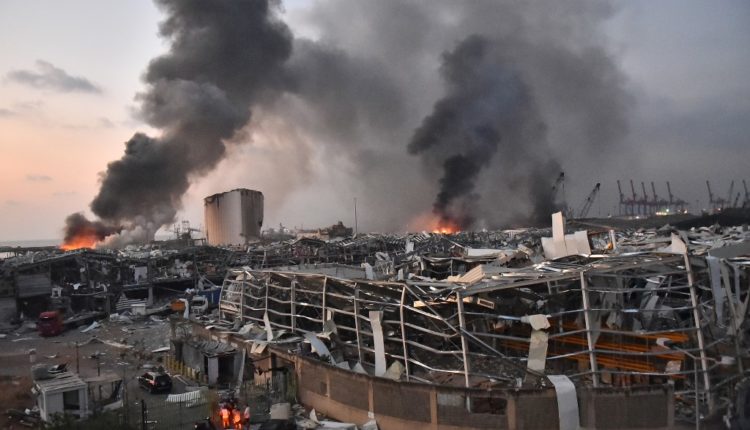
At least 27 dead; 2,500 injured in Beirut explosion
A large blast in the Lebanese capital, Beirut, has killed at least 27 people and injured more than 2,500 others, the health minister says.
It is not yet clear what caused the explosion in the port region. Videos posted online showed a column of smoke followed by a large mushroom cloud.
Hospitals are said to be overwhelmed and many buildings have been destroyed.
Lebanon’s internal security chief said the blast happened in an area housing highly explosive materials.
A BBC journalist at the scene reported dead bodies and severe damage, enough to put the port out of action.
The explosion comes at a sensitive time for Lebanon, with an economic crisis reigniting old divisions. Tensions are also high ahead of Friday’s verdict in a trial over the killing of ex-Prime Minister Rafik Hariri in 2005.
Some reports suggest the explosion may have been an accident. Lebanon’s National News Agency reported a fire breaking out at what it called an explosives depot at the port before the explosion.
Local media showed people trapped beneath rubble. A witness described the first explosion as deafening, and video footage showed wrecked cars and blast-damaged buildings.
President Michel Aoun called for an emergency meeting of the Supreme Defence Council, the presidency said on Twitter. Wednesday has been declared a day of mourning, the prime minister said.
UK Foreign Secretary Dominic Raab said the government was “ready to offer help and support” while French Foreign Minister Jean-Yves Le Drian said France was also ready to offer assistance.
‘Glass going down from all over the building’
Hadi Nasrallah, eyewitness speaking to the BBC
I saw the fire, but I didn’t yet know there was going to be an explosion. We went inside. Suddenly I lost my hearing because apparently I was too close. I lost my hearing for a few seconds, I knew something was wrong.
And then suddenly the glass just shattered all over the car, the cars around us, the shops, the stores, the buildings. Just glass going down from all over the building.
Literally all over Beirut, people were calling each other from different areas kilometres away and they were experiencing the same thing: broken glass, buildings shaking, a loud explosion.
Actually we were shocked because usually when it happens, just one area will experience those happenings after an explosion, but this time it was all of Beirut, even areas outside of Beirut.
Shock and anxiety
By Sebastian Usher, BBC Arab affairs analyst
The videos and images, not just of the massive cloud of smoke erupting in Beirut but the damage and devastation it is caused kilometres away, have triggered a new wave of shock and anxiety in Lebanon, which is already teetering on the brink of a catastrophic economic collapse.
Just hours before the blast, anti-government protesters had been scuffling with the security forces outside the ministry of energy, demanding yet again accountability from the country’s leaders.
There have been grave warnings of hunger in the streets or a reigniting of sectarian conflict if the economy worsens.
And the blast will remind many of the bomb that killed Rafik Hariri. The Lebanese will be hoping that this latest blast will remain a human tragedy – an accident – and not a premeditated act.
What’s the situation in Lebanon?
Lebanon is experiencing political turmoil, with street demonstrations against the government’s handling of the worst economic crisis since the 1975-1990 civil war.
Many blame the ruling elite who have dominated politics for years and amassed their own wealth while failing to carry out the sweeping reforms necessary to solve the country’s problems. People have to deal with daily power cuts, a lack of safe drinking water and limited public healthcare.
There has also been tension on the border with Israel, which said last week that it had thwarted an attempt by Hezbollah to infiltrate Israeli territory. But a senior Israeli official has told the BBC that “Israel has no connection” to the Beirut blast.
The blast happened close to the scene of a huge car bombing which killed ex-PM Rafik Hariri in 2005. Tuesday’s blast also came days before the long-awaited verdict in the trial at a special court in the Netherlands of four men accused of orchestrating the attack.

